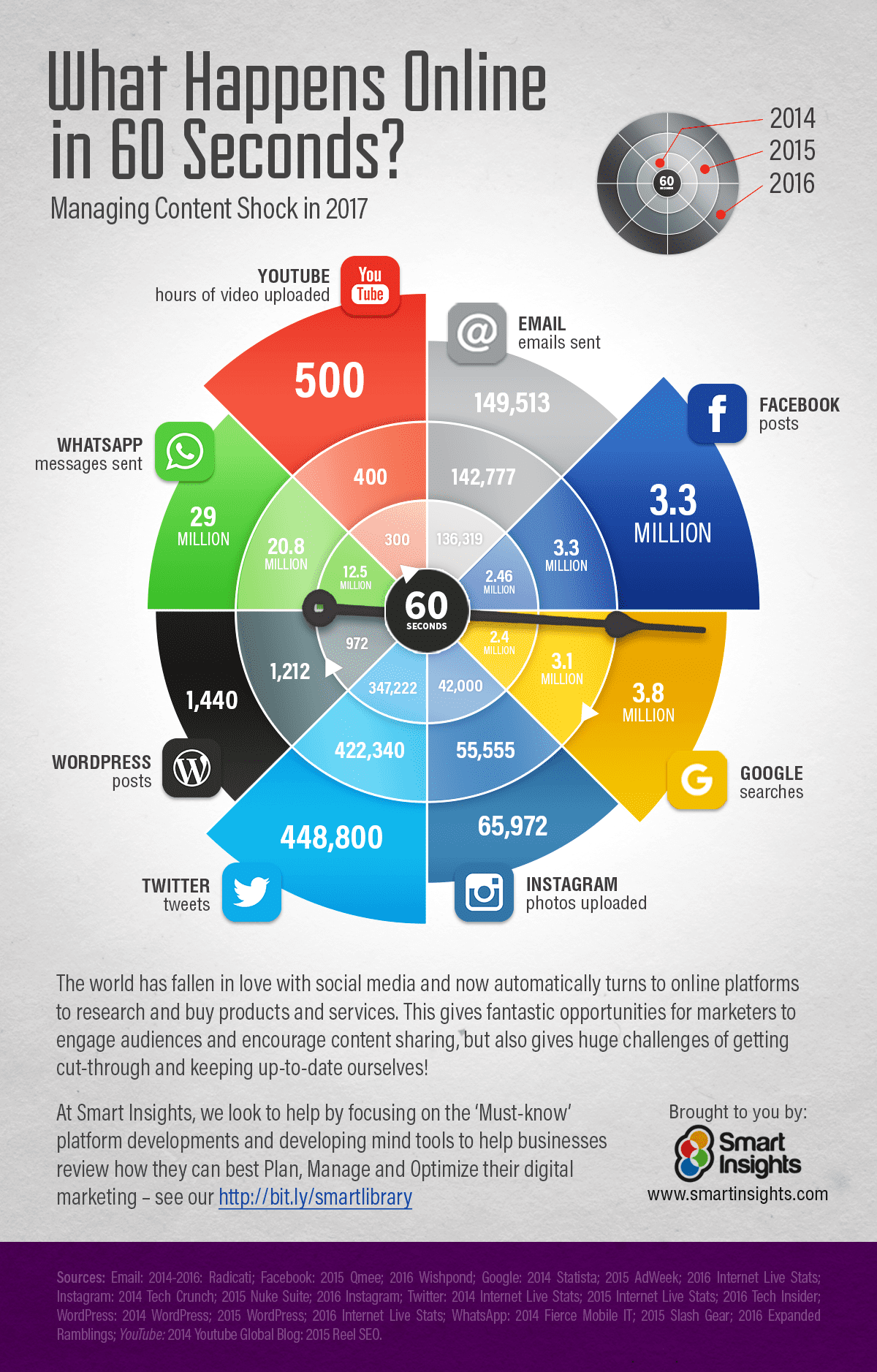Do you remember when you had to be convinced that content marketing was worth the effort? Now, it’s more popular than ever before, and has proven to be more effective than any outbound marketing activity – costing 63% less and generating three times as many leads.
In fact, 90% of all organisations now incorporate content marketing into their overall marketing strategy. We’ve evolved from bemoaning how long it takes to write a blog article, to adopting a diversity of new formats and approaches. This is, after all, a generation that can earn $10 million per year through monetised blogs on YouTube!
It’s safe to say the influence of content marketing is universal. For businesses who have adopted this channel, however, there is one potential pitfall of which to be wary. And it’s a big one.
It’s a simple equation. The more organisations produce and promote content, the more content there is available to be consumed. The more content available, the less time their audience has to identify and consume the most valuable and relevant content to their needs and interests. This is what Mark Schaefer calls ‘content shock’.
What is Content Shock?
Schaefer published an article four years ago in which he suggested that content marketing was not a sustainable strategy for many businesses. What was once a relatively uncrowded content space, “Red Bull was a beverage company, not a media company, Chipotle was making burritos, not claymation films, and there were roughly one-third as many bloggers” was becoming a “situation where content supply is exponentially exploding while content demand remains flat”.
We have now officially reached saturation point.
As well-intentioned as your efforts are, no matter how many hours you spend researching a blog post or scripting a podcast, there are no guarantees that your hours of hard work will yield positive results. The infographic below is a sobering reminder of how easy it is for your content to get lost in the crowd.
Your Content Strategy is Failing
You’ve documented your strategy, you’ve put together a content calendar, you know your target audience, you’re investing precious time and resources… and it’s not working.
In our current state of content shock, this is unsurprising. You need to be able to differentiate your brand, demonstrate your Unique Selling Points and set yourself apart from an ever-growing level of competition. To borrow from the great Steve Martin and put it simply, “be so good they can’t ignore you”.
This may seem like a near impossible prospect, but even in a world in which 500 hours of video are uploaded to YouTube every 60 seconds, you can still come out on top.
Below, we’ve listed the most likely reasons your content strategy is failing and provided 3 key easy-to-action insights that will help to turn things around!
1. You Aren't Measuring the ROI of Your Content
There’s more to content marketing metrics than Pageviews and social shares. In fact, only 8% of marketers consider themselves ‘very successful’ or ‘extremely successful’ at tracking content marketing ROI. If your business is spending time and budget on creating and distributing content, this is, unquestionably, the metric that matters most. And if you aren’t using the right tools and data points, it will be impossible to achieve.
Use a time-tracking app or iPhone timer to discern how long it takes to create a piece of content. Don’t forget to stop the timer if you’re taking a break and restart it when you resume. The worth of your cumulative time spent creating content is your investment.
To find the return, you need to discern which metrics to track. If it’s online sales, you should set up a Google Analytics User Flow report to see how many website visitors consume a blog article, click your Call To Action, move on to a product page and make a purchase. You can use this report to determine the content on your website that is most likely to convert as well as that which is underperforming and optimise your content strategy accordingly.
If the main objective of your content marketing is lead generation, you can calculate content ROI by tracking the number of contact enquiries that were completed via lead gen forms embedded in or attached to your content. Depending on how you set up your lead gen forms, this can be done through your CRM, Email Service Provider or software such as Leadformly.
If you want to adopt a more all-inclusive approach, you can use Google Analytics’ Attribution Modeling to calculate the monetary impact of every piece of content consumed at every step in the customer journey.
Once you’ve figured out what will constitute your return, calculating ROI is only a few simple steps away! Through your content ROI, you can determine which titles, topics and content formats best engage your customers and provide most value. These insights will enable you to adapt and refine your content strategy, and set you up for success!
2. You Haven't Considered Video
Incidentally, 51% of marketing professionals worldwide cite video as the content format with the best ROI. Marketers who use video content grow revenue 49% faster than those who don’t, and yet many brands are still reluctant to embrace it as part of their content strategy. Despite its unparalleled ability to boost brand awareness, generate quality leads and maximise sales, there are a few common misconceptions that deter marketers.
Many assume that video only works for top-of-funnel campaigns, when brand awareness is the key objective. Or that it’s more suitable for B2C audiences rather than B2B. Or that anyone with a smartphone can create compelling video content. Or that it’s too expensive for your organisation to have its video content created professionally.
The truth is – video can be whatever you want it to be, and achieve whatever you need it to achieve, often more effectively than other formats. Now that the average human attention span is shorter than that of a goldfish, it’s more feasible to imagine a consumer engaging with a 60 second video than a 1500 word article (apart from this one of course!). Easy-to-consume over breakfast, during a break, or a morning or evening commute, viewers also retain 95% of a video’s message compared to 10% when reading it in text – this ensures your brand stays front-of-mind amongst your target audience, providing you with a valuable opportunity to build trust.
[embed]https://www.youtube.com/watch?v=e359jWSGMVg[/embed]
3. You Aren't Being Specific
You know you need to produce content as part of your wider marketing strategy. You’re poised to film a new brand video with hopes it will go viral – but before you start, you need to be able to answer one deceptively simple question.
Why are you creating this content?
One of the most common reasons for the failure of an organisation’s content strategy is they haven’t considered the needs and interests of their customers. Consequently, their content lacks direction and clear purpose. You’ve taken the time to identify specific business goals, and specific target audience segments. Now, you need to identify your specific content niche.
It’s important to avoid becoming an aimless content creator, fluctuating between listicles and webinars and GIFs with no sense of cohesion. Consider your target market, your value proposition and your industry. From there, decide upon the most appropriate few content formats. Keeping a narrow focus will enable you to build your brand reputation, and strengthen relationships with potential and existing customers, who will come to eagerly anticipate your particular pieces of content.
You might become the company known for their emotive customer testimonial videos. Maybe your product review podcast series will be your speciality. But whatever angle you choose to adopt, stick with it, and do it well. Your content marketing performance metrics will speak for themselves!
We have the essential expertise and insight to work with your marketing team to build a content strategy that adds value and deliver solutions to the issues your customers care about. From auditing your existing content audits, to delivering on tailored, targeted editorial calendars – our content marketing experts are here to help.


